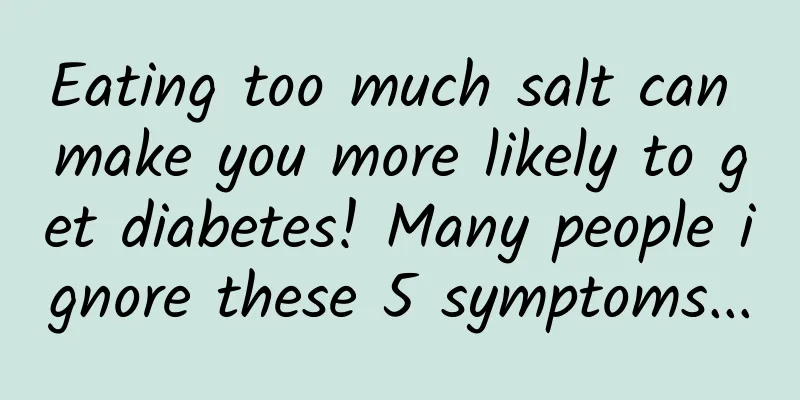Have a little fat kid at home? Don’t panic! Here’s a scientific guide to weight loss

|
In today's environment of delicious food and comfortable living, the problem of obesity among children and adolescents has become increasingly prominent, and has become a hidden worry in the hearts of parents. The National Health Commission can no longer sit still and calls on all parents: children's weight loss plans must be put on the agenda immediately! Director Mo Minghua of the Pediatrics Department of Hunan Provincial Hospital of Integrated Traditional Chinese and Western Medicine (Affiliated Hospital of Hunan Institute of Traditional Chinese Medicine) teaches everyone how to scientifically determine whether children are overweight or obese and help them lose weight in a healthy way. Sharp eyes, identify whether the child is overweight or obese Judging whether a child is overweight or obese is not something that can be determined simply by looking at him or touching his or her flesh. It requires scientific methods. 1. BMI is the gold standard BMI (Body Mass Index) is currently a commonly used international standard for measuring the degree of fatness or thinness of the human body. Its calculation formula is: BMI = weight (kg) ÷ height (m) squared. For children over 2 years old, BMI should be calculated at least once a year and judged according to the standards of corresponding age and gender. Generally speaking, a BMI of a child's age group that is greater than or equal to the 85th percentile but less than the 95th percentile is considered overweight, and a BMI of greater than or equal to the 95th percentile is considered obese. This is like drawing a "warning line" for a child's weight status, helping parents to promptly detect whether their child is developing in the direction of becoming "fat friends." 2. Check your waistline In addition to BMI, waist circumference is also an important indicator for determining obesity, especially central obesity. Central obesity means having too much fat on the belly, which is closely related to high blood pressure, high blood lipids, diabetes and other diseases. For children aged 6 to 17, if their waist circumference is greater than or equal to the 90th percentile of their peers and gender, you have to be careful. Scientific weight loss keeps your child healthy Once you find that your child is overweight or obese, you must act quickly, but losing weight is not something that can be achieved overnight and requires scientific methods. 1. Diet adjustment: Children’s “eating” needs to be carefully calculated (1) Small portions, diverse and balanced nutrition: Children should eat as much variety as possible at every meal. They should eat at least 12 kinds of food every day, including cereals, vegetables and fruits, livestock and poultry meat, eggs, milk, soy and nuts. For example, they can have a bowl of multi-grain porridge for breakfast, with a boiled egg and fresh vegetables; lunch and dinner should also maintain this "food diversity". (2) Control calories and distribute them reasonably: Obese children need to reduce their daily calorie intake appropriately, but they should not be left hungry. Generally speaking, children should be ensured to have a good breakfast, a full lunch, and a light dinner, and only eat until they are 70% to 80% full at each meal. The proportion of high-fiber, low-calorie foods such as whole grains, vegetables, and beans can be appropriately increased, and the intake of refined rice, white flour, and high-fat, high-sugar foods can be reduced. (3) Eat snacks in moderation and choose beverages carefully: Snacks are not forbidden, but you have to choose the right ones. Healthy snacks such as fruits, yogurt, and whole-wheat biscuits can be eaten in moderation, while high-calorie, low-nutrition snacks such as potato chips, candy, and chocolate must be strictly limited. For beverages, boiled water and unsweetened tea drinks are the first choice. Drink less or no sugary drinks to avoid "drinking" extra calories. 2. Sports upgrade: Get your kids moving (1) Aerobic exercise plays a leading role: Let your child do at least 60 minutes of moderate to high intensity aerobic exercise every day, such as brisk walking, jogging, skipping rope, cycling, swimming, and playing basketball. You can also take your child to the suburbs for hiking and mountain climbing on weekends, which not only exercises the body but also allows the child to get close to nature. (2) Resistance exercise to help: During the growth and development stage of children, appropriate strength training can also help increase the basal metabolic rate. Children can do some simple bodyweight training, such as squats, push-ups, sit-ups, etc., 2 to 3 times a week. (3) Cultivate interest in sports: The key is to let children find fun in sports so that they can stick to it. Let children try different sports and find the one they really like. 3. Other measures: protecting children's health in all aspects (1) A regular work and rest schedule is essential: Ensure that children get enough sleep every day. Primary school students should sleep about 10 hours, junior high school students about 9 hours, and high school students about 8 hours. At the same time, develop a fixed work and rest schedule, go to bed early and get up early, and avoid staying up late. (2) Psychological care should be provided: During the weight loss process, children may encounter frustration, pressure, or even emotional problems. Parents should pay more attention to their children’s emotional changes, provide timely encouragement and support, and help them maintain a positive attitude. (3) Co-creation of a family atmosphere: The family is an important environment for children to grow up in. Parents should set an example and develop healthy eating and exercise habits. You can organize a family sports day where everyone participates in sports activities together, so that children can more easily maintain a healthy lifestyle in a vibrant family atmosphere. Stay away from misunderstandings and don’t let good intentions lead to bad results When helping your child lose weight, there are some misunderstandings that you should stay away from. 1. Excessive dieting is not advisable Some parents will drastically reduce their children's food intake when they see that their children are fat, which is actually very dangerous. Children are in the growth and development period, and excessive dieting may lead to malnutrition and affect the normal development of their body and intelligence. 2. Blind medication is not recommended There are some slimming pills and slimming teas on the market that claim to help you lose weight quickly, but many of them pose potential risks to your child's health. Unless it is a special case and they are used under the guidance of a professional doctor, don't let your child try them easily. 3. Don’t be too eager for quick success Losing weight for children is not a 100-meter sprint, but a marathon. Don't expect to see huge changes in a week or two. Be patient, take your time, and help your children develop healthy habits that will benefit them for life. Weight loss for children and adolescents is a systematic project that requires the joint efforts of parents, schools, and society. Pediatric Director Mo Minghua called on all parents to respond to the call of the National Health Commission and use scientific methods and full of love to help children get rid of the burden of obesity and grow up healthily! Hunan Medical Chat Special Author: Fan Siyuan, Department of Pediatrics, Hunan Hospital of Integrated Traditional Chinese and Western Medicine (Affiliated Hospital of Hunan Institute of Traditional Chinese Medicine) Follow @湖南医聊 to get more health science information! (Edited by YT) |
>>: What you thought was a cold might actually be leukemia! Don’t let these symptoms fool you
Recommend
What are the benefits of eating pumpkin seeds for women
Pumpkin seeds are a common snack. Pumpkin seeds l...
What is anal itching in women?
The anus is where we defecate every day. Normally...
How many days after menstruation is a woman's safe period
Many women choose to have sex during the safe per...
How does it feel for girls to have their period?
Female friends have a deep understanding of menst...
Leucorrhea is yellow and odorless, not itchy or painful
Discharge is a kind of secretion from the female ...
What is the reason for the oil leakage from the right rear wheel of the car?
We often see some cars leaving a streak of oil on...
No menstruation for 3 months
After a woman has experienced her first menstruat...
Do uterine fibroids affect fertility?
The uterus is a reproductive organ unique to wome...
What causes abdominal distension during ovulation?
Some women may have noticed that during ovulation...
Will drinking soy milk every day make your breasts bigger? Ladies, you must know
Breast augmentation has always been a hot topic a...
1 in 4 adults has high blood lipids! Stay away from these 4 high-risk factors →
When it comes to high blood lipids, even young pe...
Can I go swimming during menstruation?
During menstruation, women are very concerned abo...
How many days without menstruation is considered pregnancy
Delayed menstruation always causes panic for wome...
Can pregnant women eat chestnuts in the early stage?
Pregnant women consume a lot of nutrients during p...
What is the cause of brown bloody vaginal discharge after menstruation?
Menstruation once a month is a process that every...









